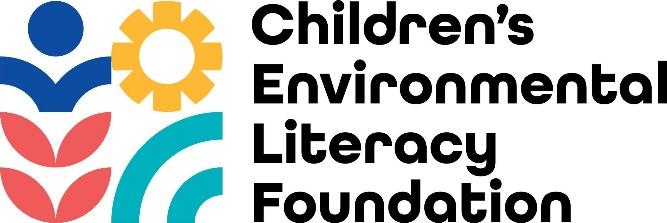Channelview ISD Teacher discussion to identify project priorities and needs for the 2024-25 school year
Generic Clearance for the Collection of Qualitative Feedback on Agency Service Delivery (Renewal)
EPA EJCPS Baseline Small Group Discussion Questions
Channelview ISD Teacher discussion to identify project priorities and needs for the 2024-25 school year
OMB: 2030-0051
OMB Control Number: 2030-0051
Expiration Date: 05/31/2024

This collection of information is approved by OMB under the Paperwork Reduction Act, 44 U.S.C. 3501 et seq. (OMB Control No. 2030-0051). Responses to this collection of information are voluntary. An agency may not conduct or sponsor, and a person is not required to respond to, a collection of information unless it displays a currently valid OMB control number. The public reporting and recordkeeping burden for this collection of information is estimated to be 1 hour per session. Send comments on the Agency’s need for this information, the accuracy of the provided burden estimates and any suggested methods for minimizing respondent burden to Director, Information Engagement Division, U.S. Environmental Protection Agency (2821T), 1200 Pennsylvania Ave., NW, Washington, D.C. 20460. Include the OMB control number in any correspondence. Do not send the completed form to this address.
Baseline Small Group Discussion Questions
Background
The Children’s Environmental Literacy Foundation is embarking on a three-year program entitled “Engaging K-12 communities in Civic Science to Monitor Air Quality and Watershed Health in Greater Houston,” with financial support from the Environmental Protection Agency under an Assistance Agreement. The project aims to cultivate the next generation of environmental justice champions, equipped with Science, Technology, Engineering, Arts, and Math (STEAM) skills to protect local watersheds and enhance climate resilience through school-community collaboration. Leveraging CELF’s Civic Science Inquiry to Action Framework, this project will work with schools in economically disadvantaged environmental justice communities of Greater Houston to deliver teacher training focused on facilitating data collection and analysis, and legacy student action projects that raise awareness of watershed stewardship strategies and solutions.
To effectively achieve the project’s objectives, we need to obtain informed, candid information from teachers who will take part in the program. The objectives of this small group discussion are as follows:
Identify teachers’ grade- and subject-specific curricular priorities and projected challenges for the 2024-25 school year
Identify teachers’ “wishlist” relating to place-based field experiences and learning outcomes for their students during the 2024-25 school year
Identify culminating student actions that civic science projects can work toward that will help educate the wider community about environmental justice challenges relating to local air and water quality.
As educators, your participation is voluntary and there will be a $50 gift card provided for your participation in this 1-hour discussion. This discussion will be recorded and saved on secure computers only accessible by project staff. This is because we need to ensure that we can reference the important details you share during the discussion. By remaining on the zoom call, you consent that your opinions shared during this discussion will be recorded and used to inform project activities as outlined above. You may choose to opt out at any time.
Discussion Questions:
This project seeks to apply CELF’s Civic Science Inquiry to Action Framework to deliver teacher training focused on facilitating data collection and analysis, and legacy student action projects that raise awareness of watershed stewardship strategies and solutions. What do you seek to accomplish through engaging your students in this program?
How do you see place-based civic science projects focused on local watershed health supporting your existing curriculum and student learning priorities?
What do you anticipate to be some of the challenges of engaging your students in civic science projects?
What do you see to be the common beliefs and/or concerns in your school community relating to concepts this project will explore, including watershed health, air quality, and climate resilience?
How do you think students can leverage their civic science projects to engage their families and communities in learning more about local watershed health and actions they can take to protect their watersheds?
| File Type | application/vnd.openxmlformats-officedocument.wordprocessingml.document |
| Author | Jackson, Aaron |
| File Modified | 0000-00-00 |
| File Created | 2024-07-20 |
© 2026 OMB.report | Privacy Policy